Here is an excerpt from her Facebook entry . . .
TWISTED still under threat in KY - you can help
The English teacher in KY who has been dealing with the challenges to several books, including TWISTED, has to jump through new hoops before the books will be allowed back in the classroom.
Three of the books: TWISTED, LESSONS OF A DEAD GIRL, and RAPTURE OF CANAAN have again been banned by the superintendent. According to the teacher, he does not feel they are appropriate for college level work, i.e. they do not belong as literature circle selections in an AP English course.
The teacher writes: "The superintendent wants to know that other schools are using these books in the classrooms, not in their libraries. If you all know of ANY schools where any of the listed books are being used, or if you have any evidence that they are "college level" and prepare students for college, PLEASE send it ...."
She gives more info and how you can help on Facebook.
Viewing: Blog Posts Tagged with: banning, Most Recent at Top [Help]
Results 1 - 21 of 21
Blog: RANDOM WRITING (Login to Add to MyJacketFlap)
JacketFlap tags: banning, Add a tag
Blog: Fahrenheit 451: Banned Books (Login to Add to MyJacketFlap)
JacketFlap tags: ala, US, banning, banned books week, Add a tag
Just a quick reminder that the American Library Association Banned Books Weeks runs from September 26 − October 3, 2009. Check out the little drama created by Puppet Book Banners.
Blog: Creative Chaos II (Login to Add to MyJacketFlap)
JacketFlap tags: censoring, books, banning, Add a tag
I hope you'll read this intelligent and eloquent posting by Laurie Halse-Anderson. I second her call for thoughtful and civil discourse on the matter.
My heart goes out to the authors who have to deal with book banning: Laurie, certainly, but also my friends Jo Knowles and Sarah Brannen. All of them have written (and illustrated) amazing books that have found and changed the lives of their target audiences. A huge thank you to the librarians and teachers who keep connecting children with meaningful literature.
Tomorrow: book reviews.
Blog: Fahrenheit 451: Banned Books (Login to Add to MyJacketFlap)
JacketFlap tags: censorship, banning, librarians, public library, Add a tag
Jessica Merritt shares a column on "25 Important Legal Issues Every Librarian Should Research" at Best Colleges Online, reminding librarians that there are important legal issues to consider. A number of points are relevant to censorship issues, especially in the United States, including the ones below:
- Filters: Many public libraries are under pressure to filter Internet access to patrons. Whether or not you do so can have legal implications for your library.
- Freedom of information: According to the First Amendment, the government is allowed to restrict information in the library. Find out what you can do about it and how you have to comply.
- Children on the Internet: Your library may be held responsible for offensive content accessed using the library’s computers, so it’s important to find out how to protect yourself.
- Hate meetings: Your library’s meeting rooms and computers may be used in order to spread and promote hateful speech and thoughts. Additionally, you may find that hateful literature is requested. Find out how to deal with this issue before it comes up.
- Book removal: Librarians have to be careful about removing books from a library’s collection. You will find that you often do not have unrestricted authority to remove offensive library books from your library.
- Banned books: Many books can be offensive to library patrons and parents of young patrons that visit your library, and books are often challenged by groups and individuals. How you deal with the removal or preservation of a book is important.
- Bulletin boards: Your library’s bulletin boards may be used as a community resource, so it’s important to consider whether or not you’re violating free speech with your bulletin board policy.
- FBI in the library: The FBI can use your library as a resource for investigating the public’s usage of your resources, so it’s important to know how to deal with it. One librarian has come up with a few technically legal signs that you can use to let patrons know they may be monitored.
In any country, it is wise to know what the law is and to be proactive by having good policies in place. Educate your staff to know how to follow through.
Blog: Fahrenheit 451: Banned Books (Login to Add to MyJacketFlap)
JacketFlap tags: banning, school, challenge, parents, teachers, Add a tag

With the permission of Flash Cap, who appears to be a teacher in the Fort Worth area, I have published the essay found in his blog entry, "Another Post on Book Banning...." This essay is a response to the controversy over teaching classics such as The Adventures of Huckleberry Finn.
In an article about the current controversy surrounding Adventures of Huckleberry Finn up in the Fort Worth area, Ron Price, a Dallas school board member, states, "We are here today to say we will not tolerate the N-word being used by any educators anywhere in our school district, throughout our region or the state of Texas. It's critical that we examine all of our textbooks to ensure that the language is proper and that the language is not being used to abuse any child in any school."
As an English teacher for ten years, I find Ron Price's statement scary, and not just because of my feelings about Twain and Huck. His statement suggests that any word deemed offensive by any student can and should be removed carte blanche from the curriculum. With this threat in mind, I started looking through my high school’s reading list in an effort to determine which works could be targeted.
Let's start with the word "nigger" - obviously, Twain's Huck Finn is gone. Tom Sawyer is, too. So are any number of his short stories and essays, including a scathing condemnation of a southern lynching entitled "Only a Nigger." But Twain's not the only author whose works will be culled. So, too, will Harper Lee's To Kill a Mockingbird. William Faulkner's "A Rose for Emily" is removed, as are any number of his novels. Flannery O'Connor is also guilty of using the word in a few of her stories. Catch-22 is gone. A few Hemingway works won't make the cut (including The Sun Also Rises) and, to be consistent, neither will Ralph Ellison's Invisible Man, Richard Wright's novels Black Boy and Native Son, and Frederick Douglass' Autobiography (and most other slave narratives I've read). So right there we've effectively silenced three of the greatest African-American voices in American literature. But, hey, at least students won't be exposed to the word "nigger," right?
Swear words (not just racial epithets) are offensive, too. Good-bye, Catcher in the Rye, Of Mice and Men, Cold Mountain, Catch-22, Invisible Man, and Fahrenheit-451 (oh, the irony!). The boys of Lord of the Flies should have their mouths washed out with soap, and Orwell’s 1984 is horrid. Rudolfo Anaya’s Bless Me, Ultima is gone (and I haven't even mentioned the witchcraft in that one...oops), as are Seabiscuit and A Separate Peace. Don't even get me started on Grendel, that monster (why can't he act civilized?). No wonder I hear all sorts of curse words in the hallways - the literature students are reading is setting the standard.
Let's move on to not just words, but actions (actions speak louder than words, you know). I know many people find sex offensive, particularly between unmarried people. So, so long, Scarlet Letter and Cold Mountain; good bye, Romeo and Juliet. The Great Gatsby has an affair in it, so scratch that, and the trouble in Arthur Miller’s The Crucible all starts with an affair between John Proctor and Abigail (but maybe we can leave that one in, since John is hanged at the end). Wait a minute - Willy Loman has an affair in Death of a Salesman - obviously Miller has some strange fixation on sexual trysts so let's ban 'em both. Catch-22 and Invisible Man are now three-time offenders, so perhaps we can burn them and drive home the point (I mean, do they have ANY redeemable qualities? Oops, that's beside the point). Dances with Wolves - Dunbar masturbates! And then he fools around with Stands With a Fist (this is after being fondled by some young indian women). The senior level reading list is chock-full of sex (implicit and explicit) -- Kate Chopin, you're not fooling anyone. Nude women abound in The Odyssey, and The Picture of Dorian Gray is scandalous (the foreword Wilde writes, notwithstanding). Not a sexual episode, but in Jonathan Swift’s Gulliver’s Travels the titular Gulliver actually pees on a house to douse a fire – how lewd! Students don't need to be reading that, it's distracting and they'd laugh, and then the next thing we know THEY'LL be peeing on house fires (maybe we could just excise that portion).
And what about witchcraft? Goodbye Macbeth, Hamlet and Julius Caesar (is there ANY Shakespeare work that would be safe?) and The Crucible centers around it. If we throw in religion (don't want to start in with what any religious books say, as it might make some students uncomfortable) we also have to get rid of The Poisonwood Bible, any Puritan readings (Edwards' "Sinners in the Hands of an Angry God", for example), and let's just ignore any allusions made in any other works ("Mr. Williams, what does Patrick Henry mean when he says 'Don't be betrayed by a kiss'?" "Just ignore that line, student of mine, it could be offensive if I explain it"). Practically nothing Abraham Lincoln wrote could be read (he was President! How dare he quote the Bible!), and more recently published novels being considered by our English staff like Life of Pi and The Kite Runner (both finalists for the Brazos Valley Reads program) are immediately verboten. Oops, perhaps I shouldn't use German because of the negative connotation it might have.
Strangely enough, graphic violence doesn't seem to offend anyone. But violence is usually accompanied by swearing (people who get shot/stabbed/poisoned are generally nonplussed) so it's a moot point.
Some reading this might reply that I’m descending onto a slippery slope. Perhaps a bit, but I would also point out that every specific work mentioned above has been challenged at a school somewhere in this country for the exact reason given. So here's the question: if we shouldn't include anything in our curriculum that could possibly/maybe/might offend someone, what exactly do we read? Does context not count anymore? Does authorial intent not mean anything? My entire AP reading list is gone, based on Ron Price's argument that began this missive. Most of the works included in Consolidated's English curriculum are questionable because they could make some students uncomfortable, and apparently that's not what some in high places believe literature should do.
But I would argue that this is EXACTLY what it should do. This is what great literature (i.e. education) does: it makes us question our society, our world, our selves, and questions without immediate answers are uncomfortable. When we read any novel, we come into it with preconceived ideas and if the book makes us question those ideas, we're forced to THINK about why we believe the things we do. Huck Finn makes us think about race (which will ALWAYS be an issue in the U.S., even if we abolish the word 'nigger') and how supposedly civilized people treat one another. It's a tale of how difficult it actually is to overcome the supposed "truths" society feeds us from day one, and it's a tale of friendship. To ban this book (and others) for the use of deemed "offensive" words, disregarding entirely the context of such use and the author's intent, is a crime far greater than making a student uncomfortable. Yes, some ideas we encounter in our education can be offensive, but if teachers are just in the business of reinforcing preconceived notions/ideas, playing it safe, why the hell are we here?
Blog: RANDOM WRITING (Login to Add to MyJacketFlap)
JacketFlap tags: banning, writing, jonowrimo, Add a tag
1. It's The Day After Thanksgiving and I'm gearing up for Thanksgiving Two. Years ago, when I was just a mere newlywed, hubby's side of the family moved their traditional meal to Saturday. My in-laws wanted all five of their children, the spouses and grandchildren at their table every year. I truly enjoy being able to see both sides of my family every year because it's what I'm most thankful for. My thighs, however, are NOT thankful! LOL
2. Please check out ![]() carriejones post for November 23rd. (I wanted to devote a whole blog to this myself, but Carrie says it so much better than I) Ritchie Partington was fired from his library consultant's position with the Bellevue Union School District in Santa Rosa California a day after refusing to meet with a principal who had banned Rodman Philbrick's The Last Book in the Universe from his school's library without having read it.
carriejones post for November 23rd. (I wanted to devote a whole blog to this myself, but Carrie says it so much better than I) Ritchie Partington was fired from his library consultant's position with the Bellevue Union School District in Santa Rosa California a day after refusing to meet with a principal who had banned Rodman Philbrick's The Last Book in the Universe from his school's library without having read it.
3. I received Light Speeder back and while it was rejected, I was given some wonderful notes/thoughts from the editor. I'm letting it sit for a bit before I decide what to do. Do I send it out one more time to see if the feedback matches? Or do I put it away until I have time to ponder a rewrite? Decisions, decisions . . .
4. A's friends are all coming over to play Guitar Hero tonight. You know who's most excited? B. We don't have playstation. B feels quite deprived, even though he has a computer alllll to himself.
5. I'm so close to completing my JoNoWriMo goal! If I try really, really hard, I think I can finish the first draft of
George's Story by 12/1.
6. Hubby, A and I have been watching Hero's season one the last few days. We'd snuggle up in the livingroom with the intention of watching two episodes, and the next thing we knew it was two in the morning! Talk about teaser endings! Holy, moly. If anyone doesn't understand the concept of "leaving your readers hanging", study Heros.
Blog: Fahrenheit 451: Banned Books (Login to Add to MyJacketFlap)
JacketFlap tags: podcast, censorship, banning, banned book list, resources, Add a tag
Delete Censorship has a new look and some great new resources for anyone looking for information on banned books and other censorship issues. I personally like the moving book shelf. Click on an icon of a book and get the information on why it was challenged. Podcasts on issues around censorship are available for download.
The Constitution of the United States, Amendments to the U.S. Constitution, and Proclamation of Freedom to Read are available in PDF format.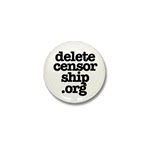 Although this site is sponsored by a book seller, the advertising is neither subliminal nor blatantly obvious.
Although this site is sponsored by a book seller, the advertising is neither subliminal nor blatantly obvious.
Blog: Fahrenheit 451: Banned Books (Login to Add to MyJacketFlap)
JacketFlap tags: censorship, banning, James Bond, Ian Fleming, Add a tag
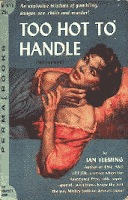 For everything Bond and for information on Bond Novels that were edited, censored and banned (and some still are in some countries), visit this study of the history of the banning, editing and censorship of Ian Fleming’s James Bond novels.
For everything Bond and for information on Bond Novels that were edited, censored and banned (and some still are in some countries), visit this study of the history of the banning, editing and censorship of Ian Fleming’s James Bond novels.
Blog: Becky's Book Reviews (Login to Add to MyJacketFlap)
JacketFlap tags: banning, challenged books, Add a tag
Perhaps inspired by Fahrenheit 451, perhaps inspired by the lingering conversations over the The Bermudez Triangle by Maureen Johnson controversy, I did a little google search and found an almost unbelievable website.
http://www.pabbis.com/
PABBIS stands for Parents Against Bad Books In Schools. (Now I could understand if there was a group called TABBIS or SABBIS standing for Teens Against Boring Books in Schools or Students Against Boring Books in Schools. I would probably have been among the numbers. My own group (of two) was LAASR. Library Aides Against Shelf Reading.)
Overview of PABBIS can be read as either a pdf file or powerpoint presentation. I encourage you to do so...not because I agree with them. But because it's best to learn about them based on what they say about themselves.
You might be shocked at the sensitive, controversial and inappropriate material that can be found in books in K-12 schools. Both in the classroom and library. Parents should be aware of what their children can or must read in school to decide whether it is appropriate for them or not.
Bad is not for us to determine. Bad is what you determine is bad. Bad is what you think is bad for your child. What each parent considers bad varies and depends on their unique situation, family and values. The main purpose of this webpage is to identify some books that might be considered bad and why someone might consider them bad. Another purpose of this webpage is to provide information related to bad books in schools.
In considering what is a good/bad book consider the following:
Age appropriateness
Good taste
What are educational goals/objectives and does book achieve them?
Is book relevant to curriculum, standards of learning, program of instruction?
Is this particular book necessary? Are other books without bad content equal or better in doing the job? Which ones were considered?
The website then proceeds to list hundreds--if not thousands--of books that are potentially "bad" or "dangerous" for your child/teen to read. They also encourage parents to become active within their community by challenging books in their schools' libraries. Here is their what to do page.
The general flavor will be that the book will be assumed good and you must prove it not. Here are some questions to keep in mind regarding why the book was selected for use:
- What are the course/library objectives?
- Were any alternative books available and/or considered to achieve the course/library objectives? If so, what were they?
-What sources were consulted in identifying potential alternative books to achieve the course/library objectives?
- If other books were available and/or considered why was this book selected and all other books rejected (censored)?
- If less controversial books were considered and rejected (censored) explain why.
- What is name and position of individual who approved the book for school system use?
The thing I find most fascinating about this website is that they accuse the school library system of censorship. They make themselves the victims. Their values. Their morals. Their beliefs are being censored from the library. The presence of "bad" books over the presence of "good" books makes a case for censorship in their opinion.
Typically I have remained quiet about this issue. Never been one to thump books and shout out opinions. My opinion on "challenging" or "banning" books is this: it is ridiculous and counter-productive. The best thing to do about a controversial book--if you object to it--is nothing. Draw no attention to it. Don't protest its presence in the libraries. Don't talk about it. Don't write letters of complaint. Ignore it completely. Pretend it doesn't exist. When you challenge a book or protest it, you draw attention to it that it (almost) never would have received otherwise. Sure it might have been read by a handful of students over the course of a year, but challenging it makes it appealing. It brings attention to it. Suddenly there is an interest there. A desire to read something that someone has labeled "bad" or "inappropriate" or "dangerous." Essentially you're saying, "Read this book" when you challenge it. Making it unavailable at the school library will make it something that will fly off the public library shelves. Or the bookstores for that matter. Sometimes a book being "banned" is good for the author. Good for business. Sales increase. Interest increases. They become more read, more popular. They become more famous. There is no way to make a "challenged" book unavailable. And that's a GOOD thing.
I also think it's a misnomer for a book to be labeled "banned." Most people think the word makes it official. National, even. A book could be taken off the shelves in one school district's libraries but be available in EVERY other school library across the nation...and available in public libraries...and bookstores...and whatnot...and still wear the label "banned." It could have been removed for one year or semester, and later placed back on the shelves. Yet it will wear the title "banned" for life. So it is a bit misleading.
There are several different issues going on here. It is one thing to have a book available as part of the library's collection. Another thing to make it required reading for every student within a class or grade. A parent could legitimately not like one of the required books and request an alternative be provided for their son or daughter. But here is the thing...anytime a parent makes it about more than their child...it becomes wrong. It is not one parent's right or responsibility to monitor another parent's child. If they want to be active in monitoring their own child's reading material up into the teen years, fine. Let them. Let them have a say in what their child reads and brings home from the library. Let them be vigilant about it. But that parent has no right to dictate what other students are reading in the classroom or library. Because one parent finds homosexuality offensive in a book, suddenly, the whole school is deprived of that book? Because one person finds violence offensive, the whole student body is denied their right to read it? Who says that the most vocal parent wins the day?
Do parents have the right to monitor what their own child reads? Sure. I'm not really an advocate of strict sheltering though. Why? If you've raised a child for twelve or fifteen years and you still don't trust them to make their own decisions...then you didn't do something right. If you've got a fifteen or sixteen year old child and you haven't taught them your own morals and beliefs...it's a little too late to be concerned. If you're afraid that your son or daughter will pick up a book like Speak (or any other so called "bad" book) and become inspired to give alcohol a try...then you've missed the point of everything. Parents are supposed to be raising kids to be responsible and independent. If the values haven't "stuck" yet...and you've got a teenager...you've got a lot more worries ahead of you than worrying about the language in a book. About the sexual content of a book. If you've raised your son or daughter to *share* your particular views on sex, drugs, drinking, smoking, then exposing them or allowing them to read widely won't hurt them. If they *know* premarital sex is a sin, then reading a book won't convince them otherwise. If they know to say no to drugs, then reading a book about a person who makes different choices (and who usually comes to regret those choices) won't change their minds. Parents should realize that reading a book about a person who does "bad things" won't make your child into a person who does "bad things." If you've raised a child to be smart and to think for themselves, then there is no book that is TOO dangerous. Trying to shelter kids/teens from the 'real' world is more dangerous than allowing them access to it. The key is discussion. It would be better to have them read a book and discuss it with adults...than to never be allowed access to it. If the racism in a book makes it "dangerous" then I say not reading it and discussing it--its implications, etc--is far more dangerous. To pretend that racial atrocities never happened is more dangerous than exposing your kids to the truth of it. They need to see where we've been in order to appreciate how far we've come in society...and how much further we need to go. They need to be exposed to injustice. To violence in some situations. Otherwise, how will they ever learn to deal with the world? Here's the thing, kids and teens should be allowed to think for themselves. If the teen isn't comfortable with a book, they won't read it. They won't be interested in reading it if it is offensive to them. And as far as classroom requirements go, there is usually a value in a book that makes small offenses seem petty when you look at the big picture. If there is one thing I'd like to get across about ANY book, is that you should judge it as a whole. Look at the whole book. Weigh its value. Weigh its merits. Determine its strengths. Its weaknesses. Examine its message. Does the presence of a four lettered word really destroy the value of the whole book? Isn't there a bigger picture? If a book's message is that racism is unjust. That racism is wrong. That the human race is cruel. That a person's worth isn't determined by the color of their skin. Isn't that more important than the presence of a racial slur. Isn't showing the harshness and cruelty of it more important than sugarcoating history? Should we really pretend that all races have always got along? That we've always lived in harmony? That we've never called each other names? That we've never done cruel, hurtful things? Isn't the harsh truth better than sugarcoated lies? Isn't it better to discuss the reality of the world instead of presenting a make-believe world where there are no problems? Does Elsie Dinsmore really have more to offer teen girls than Melinda does from Speak??? Seriously.
Obviously, not every book is appropriate for every age group. What is appropriate for a high school wouldn't be appropriate for an elementary school. What a 17 year old should be allowed access to...is not what a 9 year old should have access to. There is common sense involved. But for the most part, I think librarians use common sense.
Blog: Fahrenheit 451: Banned Books (Login to Add to MyJacketFlap)
JacketFlap tags: banning, Banned Book Challenge, dystopian literature, Add a tag
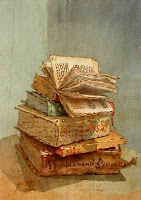
Many of this blog's readers are taking part in our Banned Book Challenge and a number of people have completed their reading. For the rest of you, don't worry, you have until June 30.
What is it about Dystopian books that gets them banned so frequently? Are we disturbed by a worldview that is a little too close for comfort? Anyway, if you are looking for the next challenge, check out the Dystopian Challenge blog. Not all of the books are necessary challenged or banned but the lists do cross.
Happy reading.
Blog: Fahrenheit 451: Banned Books (Login to Add to MyJacketFlap)
JacketFlap tags: Young Adult, banning, school, maureen johnson, Bermudez Triangle, Add a tag
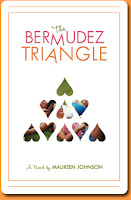
I AM A VERY DANGEROUS PERSON is the title of a recent entry on Maureen Johnson's web log.
She had received an email from Ninja Librarian Susan Hunt of the Bartlesville, Oklahoma school district, where a challenge to Maureen Johnson's The Bermudez Triangle,a Young Adult novel, was made on March 4, 2007. The committee reconsidering the novel informed Susan Hunt that the decision had been made to pull the book from the library. Apparently in 19 years, this is the first book that has raised objections.
Says Johnson,
Well, well, well. Looks like I went and got myself banned! Apparently I have written something so dangerous that it can’t be contained on the shelf of a high school library.
This was the letter that started it all:
I’m shocked and appalled at the lack of discretion, and moral decline in the selection of books at the Mid-High library. Homosexual content, unprotected sex, underage drinking, and reckless promiscuity are not values that belong in a school library. I understand there are parents or teens who are dealing with these issues, but not all parents want their kids exposed to this material. Personally, I would not endorse any of these types of book as “14-and-15-year-old-friendly.” Giving teenagers knowledge without guidance is irresponsible and dangerous. As a parent, I screen my 15-year-old’s television, Internet, video game, magazines, and books. There are things she’s not mature enough to handle, or are simply wrong for her. Parents are a child’s best line of defense in a world that rushes to grow them up too soon. This book, “The Bermudez Triangle” has no moral fiber, and wrongly promotes a “do whomever you want to discover yourself” mentality. There’s no mention of the myriad of diseases, pregnancy, destruction of friendships and lives that are very real consequences of a “sexual free-for-all” decision. I ask that his material be removed at once. You have a responsibility to the children at school to protect them and educate them. Let’s raise the bar a little higher, respect moral values and a parent’s right to guard that which has been entrusted to their care.
Johnson maintains that there is no sex in the book, but there is kissing. Says the author,
No moral fiber? Really? I beg to differ. The book is entirely about what happens to friendships when relationships enter the picture. That is, in fact, the whole book. Since there is no sex in it (just some kissing), pregnancy is not really an issue.
She explains that her mother who wouldn't let her wear denim skirts and still tells her that the stork brought her can't find a reason for banning the book.
I say she has joined the ranks of some excellent authors.
Read and watch author John Green's take on the banning on his "Brotherhood 2.0" blog.
Blog: Fahrenheit 451: Banned Books (Login to Add to MyJacketFlap)
JacketFlap tags: banning, challenged, Brokeback Mountain, AS IF, Annie Proulx, Add a tag
Bookslut explains the founding of AS IF! (Authors Supporting Intellectual Freedom).
According to the post,
In May 2005, Cary McNair told the St. Andrew's Episcopal School in Austin, TX that if they did not remove Annie Proulx's short story "Brokeback Mountain" from its 12th grade reading list, he would pull a donation of $3 million to the school's rebuilding fund. St. Andrew's board of trustees opted to leave the story on the reading list and let McNair keep his money. Board member Bill Miller said, "St. Andrew's has a policy not to accept conditional gifts, whether it's $5 or $500,000."
The school's decision caught the attention of author Lisa Yee, who posted the story on a listserv for young adult fiction authors. Two other authors had the same immediate response. Jordan Sonnenblick said, "[Mark Williams] and I posted back at the same time, 'We need to all send books to that school to support them.'"
With that, AS IF! (Authors Supporting Intellectual Freedom) was born. Forty young adult fiction writers agreed to send signed copies of their books to the school to show their appreciation.
A number of authors involved with AS IF! have had their work challenged. Others are involved because they believe banning books is wrong.
Blog: Fahrenheit 451: Banned Books (Login to Add to MyJacketFlap)
JacketFlap tags: censorship, banning, three wishes, deborah ellis, Wild Swans, Jung Chang, Banned Book Challenge, Add a tag
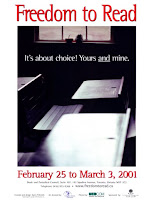 A lot of people come to this page looking for discussion guides on particular books. I have posted ones that we have used at the Pelham Public Library for others to use.
A lot of people come to this page looking for discussion guides on particular books. I have posted ones that we have used at the Pelham Public Library for others to use.
One covers banning and censorship issues. There is a new discussion guide for Three Wishes: Palestinian and Israeli Children Speak. A discussion guide for Wild Swans was published previously.
Take the "Banned Book Challenge" with the Pelham Public Library.
Freedom to Read Poster 2001
Blog: Fahrenheit 451: Banned Books (Login to Add to MyJacketFlap)
JacketFlap tags: censorship, banning, India, Add a tag
Take the Pelham Public Library's "Banned Book Challenge."
Blogger Niranjana Iyer, a Canadian living in Asia (Niranjana corrects me to say she is an Asia living in Canada), shares a link to some books banned in India. Visit Brown Paper where she reviews literary fiction and non-fiction and highlights Canadian book news. She adds,
Two famous banned books not mentioned on that list include Salman Rushdie’s Satanic Verses and Taslima Nasreen’s Dwikhandito.
I invite readers from around the world to send links or lists of their country's banned or censored books and I will try to publish as many as I can. Visit the right sidebar for links to censorship in Canada, the US, Cuba, and Malaysia.
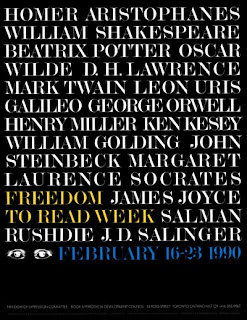
Blog: Fahrenheit 451: Banned Books (Login to Add to MyJacketFlap)
JacketFlap tags: school board, banning, school, 2006, public library, Add a tag

Bookslut has an article on titles from 2006 which have been challenged. Read the article by Chris Zammarelli for full details of what happened with these challenges.
The Well by Mildred Taylor
"...removed from an elementary school reading list for Black History Month in Absecon, NJ because of a racial epithet used in the book...."
I Know Why the Caged Bird Sings by Maya Angelou
The mother of a high school freshman in Annapolis, MD asked that it be banned because of its mature themes.
The Handmaid's Tale by Margaret Atwood
The superintendent of the Judson School District Board, San Antonio, TX ordered the book taken out of the advanced English curriculum when a parent complained it contained sexual and anti-Christian content.
Vamos a Cuba by Alta Schreier
Cuban exiles requested Miami-Dade School Board, FL ban this children's book because it portrayed an unrealistic portrait of life in Cuba. School board member Frank Balanos had the book pulled from classroom shelves, although the book stayed in the library.
Harry Potter series by J.K. Rowling
Laura Mallory spent much of 2006 trying to get Harry Potter banned from Gwinnett (GA) County Public Schools because of its theme of witchcraft.
Lord of the Flies by William Golding
Parents of students at Apalachee High School in GA had an edition of Lord of the Flies removed because it contained an essay by E.L. Epstein that commented on the rape-like nature of the pig-slaying scene.
Beloved by Toni Morrison and eight other titles
Board member Leslie Pinney in Arlington Heights, IL called for such titles as Toni Morrison's Beloved and Kurt Vonnegut's Slaughterhouse-Five to be banned because of their obscene content.
Sex Kittens and Horn Dawgs Fall in Love by Maryrose Wood and nine other titles
The Hernando County (FL) County School Board removed 10 titles from the library's book order, including Sex Kittens and Horn Dawgs Fall in Love by Maryrose Wood and The Bean Trees by Barbara Kingsolver. School board member Sandra Nicholson requested the titles removed because they contained offensive language.
The Learning Tree by Gordon Parks
Fleet Belle of the Mobile County (AL) school board requested The Learning Tree be removed from LeFlore High School summer reading list because of its offensive language and sexual content.
The Joy of Gay Sex by Charles Silverstein and Felice Picano
The Nampa (ID) Public Library Board voted to retain The Joy of Gay Sex, but ordered the book and 60 other books about sex be placed on the top shelves on the library.
And Tango Makes Three by Peter Parnell and Justin Richardson
Some people in Shiloh, IL and Charlotte, NC objected to this children's book about two male penguins raising a baby penguin because, well, it's about two male penguins raising a baby penguin. It's based on the true story of two male penguins at the Central Park Zoo.
What's Eating Gilbert Grape? by Peter Hedges
The superintendent of Carroll (IA) Schools pulled Peter Hedges's What's Eating Gilbert Grape? from a class about books made into movies because a parent complained about an oral sex scene in the book.
Take the Banned Book Challenge. Watch for details to be posted here next week.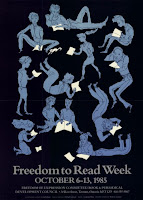
Freedom to Read Poster 1985
Blog: Fahrenheit 451: Banned Books (Login to Add to MyJacketFlap)
JacketFlap tags: school board, banning, Black Boy, The Bluest Eye, Richard Wright, Toni Morrison, Add a tag
Two more books are being challenged by parents of Howell Public High School students. In this entry and this entry, there is information about The Freedom Writers Diary which faced a challenge from parents and a community group called "LOVE" (Livingston Organization for Values in Education) because of profanity. Today the Daily Press and Argus reports that Black Boy by Richard Wright and The Bluest Eye by Toni Morrison which are both taught in Grade 11 may be removed from the curriculum because of graphic sexual content and profanity. A decision as to whether they would left in the classroom was delayed because the school board did not have the necessary number of votes to either approve or table the curriculum. The two books have been on the curriculum for years but a change from semesters to year-long classes opened the opportunity for debate on the books being used.
The newspaper reports that the majority of the speakers were in favor of allowing the continued use of the books and that they were loudly applauded by the crowd of about 150 people. The curriculum was approved by a group of teachers from the particular school, a district-wide subject-specific content committee, a district-wide curriculum and assessment committee, among others, before being presented to the school board.
The curriculum was approved by the school board with voting on the books themselves to be voted on at the February meeting.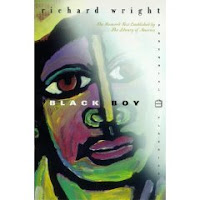 The The Merriam-Webster Encylopedia of Literature describes Black Boy as follows:
The The Merriam-Webster Encylopedia of Literature describes Black Boy as follows:
Autobiography by Richard Wright, published in 1945 and considered to be one of his finest works. The book is sometimes considered a fictionalized autobiography or an autobiographical novel because of its use of novelistic techniques. Black Boy describes vividly Wright's often harsh, hardscrabble boyhood and youth in rural Mississippi and in Memphis, Tenn. When the work was first published, many white critics viewed Black Boy primarily as an attack on racist Southern white society. From the 1960s the work came to be understood as the story of Wright's coming of age and development as a writer whose race, though a primary component of his life, was but one of many that formed him as an artist.
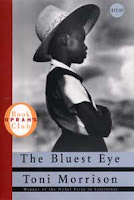 Random House describes the book as follows:
Random House describes the book as follows:The Bluest Eye, published in 1970, is the first novel written by Toni Morrison, winner of the 1993 Nobel Prize in Literature.
It is the story of eleven-year-old Pecola Breedlove--a black girl in an America whose love for its blond, blue-eyed children can devastate all others--who prays for her eyes to turn blue: so that she will be beautiful, so that people will look at her, so that her world will be different. This is the story of the nightmare at the heart of her yearning and the tragedy of its fulfillment.
February 5, 2007
"Communications Guru," editor of Conservative Media weighs in on challenges in Howell, MI, his community.The Conservative Media: School district appears to be caving to book burners
Blog: Fahrenheit 451: Banned Books (Login to Add to MyJacketFlap)
JacketFlap tags: Yoko Kawashima Watkins, school board, So Far From the Bamboo Grove, banning, Add a tag
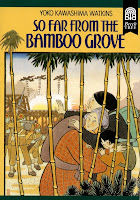 Kudos to Perry Davis, Superintendent of the Dover-Sherborn School Board for finding a better way.
Kudos to Perry Davis, Superintendent of the Dover-Sherborn School Board for finding a better way.
The Dover-Sherborn Community Newspaper, in Massachusetts, reports that the Dover-Sherborn Regional School committee has reversed its decision to remove So Far from the Bamboo Grove from the grade six curriculum.
Opponents of the book leveled criticisms that the book was biased in its look at the occupation of Korea by Japan and alleged atrocities committed against the occupying Japanese.
A synopsis, according to The Glenco Literature Library, which also includes a study guide,
Although she is Japanese, eleven-year-old Yoko Kawashima has lived all her life in Korea. So Far from the Bamboo Grove follows the experiences of young Yoko as World War II comes to an end and Korea is engulfed in turmoil as Koreans revolt to take back their homeland. Yoko and her family are forced to leave their tranquil home in Korea and to flee back to Japan in this story of heartbreak, cruelty, survival, and courage.
According to Davis, there were a number of issues to address including:
"...concern for the banning or censorship of a book...support for the use of the book and its author because of the positive experience of the students when coming to understand a personal struggle to survive; concern for the content of the book and questioning the maturity of students in the sixth grade to understand issues of rape and war; concern that the book is not balanced in its reporting of events at the end of World War II and the occupation of Korea by Japan.
The decision was made to keep the book in the curriculum but to bring balance to the unit on survival through the use of additional texts to provide background.
Blog: Fahrenheit 451: Banned Books (Login to Add to MyJacketFlap)
JacketFlap tags: library, censorship, banning, Alexandria, Add a tag
Thanks to Taryn who shares these quotations about censorship from various sources.
A truly great library contains something in it to offend everyone - Jo Godwin
Any Book worth banning is a Book worth reading
Censor: n. Someone who thinks they know more then you should
The worst thing about censorship is
They got the library at Alexandria -- they're not getting mine
Blog: Fahrenheit 451: Banned Books (Login to Add to MyJacketFlap)
JacketFlap tags: banning, 1984, George Orwell, Animal Farm, Fobidden Library, ban, Add a tag
 Read any of George Orwell's works online for free, including 1984 and Animal Farm at "The Complete Works of George Orwell." The books and other writings are searchable. Also included are Orwell's biography, photographs, and quotations. Both books have faced censorship.
Read any of George Orwell's works online for free, including 1984 and Animal Farm at "The Complete Works of George Orwell." The books and other writings are searchable. Also included are Orwell's biography, photographs, and quotations. Both books have faced censorship.
The Forbidden Library reports that 1984, was challenged in Jackson County, Fla. (1981) because the novel is "pro-communist and contained explicit sexual matter."
E-notes explains of Animal Farm,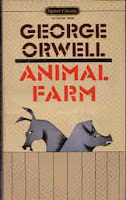
Completed in 1944, the book remained unpublished for more than a year because British publishing firms declined to offend the country's Soviet allies. Finally the small leftist firm of Secker & Warburg printed it, and the short novel became a critical and popular triumph. It has been translated into many languages but was banned by Soviet authorities throughout the Soviet-controlled regions of the world because of its political content.
Wikipedia adds,
Orwell originally prepared a preface which complains about British government suppression of his book, self-imposed British self-censorship and how the British people were suppressing criticism of the USSR, their World War II ally. "The sinister fact about literary censorship in England is that it is largely voluntary. ... [Things are] kept right out of the British press, not because the Government intervened but because of a general tacit agreement that ‘it wouldn’t do’ to mention that particular fact." Somewhat ironically, the preface itself was censored and is not published with most copies of the book.
Blog: Fahrenheit 451: Banned Books (Login to Add to MyJacketFlap)
JacketFlap tags: Iowa, school board, banning, What's Eating Gilbert Grape, Add a tag
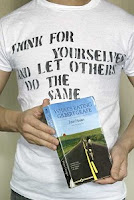 What's Eating Gilbert Grape has been removed from a Carroll, IL High School class, according to a story in the local news. School Board Superintendent Rob Cordes pulled the book from the literature-to-film class following parents' concerns over an oral sex scene in the book. He had not read the book. Critics of the pulling of Gilbert Grape are upset that one person was able to have the power to ban the book without a hearing in the court of public opinion. A committee will be reviewing the book. However, for now the book remains out of the classroom.
What's Eating Gilbert Grape has been removed from a Carroll, IL High School class, according to a story in the local news. School Board Superintendent Rob Cordes pulled the book from the literature-to-film class following parents' concerns over an oral sex scene in the book. He had not read the book. Critics of the pulling of Gilbert Grape are upset that one person was able to have the power to ban the book without a hearing in the court of public opinion. A committee will be reviewing the book. However, for now the book remains out of the classroom.
At the school board meeting, one parent held up copies of both the book and a Penthouse magazine to make a comparison. Mr. and Mrs. Huckas who object to the use of the book wrote in a letter to the school district, "We would not want to fill our minds with such garbage. It promotes immorality, adultery, fornication and self-indulgence." They had not read the book. The parents also want the district to consider removing more books from both the library and the curriculum.
Students from local high schools along with alumni have formed "Un-ban Gilbert Grape! Censorship Is Wrong," an organized group on the Web network Facebook. Several of the high school's students have created T-shirts that have free-speech quotations such as, "Censorship feeds the dirty mind more than the four-letter word" and "Think for yourself and let others do the same" and "books won't stay banned and ideas won't go to jail."
What's Eating Gilbert Grape, a novel by Peter Hedges, is about a young man's experiences with his troubled family in a small Iowa town. One of its main characters is mentally challenged. One student is quoted as saying that the characters in the book are "going through a lot of the same things our classmates are going through. They're stuck in a small environment, everyone knows them." He added that the book is the only one he can recall reading in the class written by an Iowa author. Carroll High School teacher-librarian Kelly Fischbach says the book deserves to be judged in its entirety, not for a few sentences. She calls it a 'great book' that connects with rural Iowa teens.
Apparently parents were already notified of its content before it was used in class and had to sign a permission slip for their child to read it. Students or parents who object to their child reading the book are able to be assigned alternative assignments.
Blog: Fahrenheit 451: Banned Books (Login to Add to MyJacketFlap)
JacketFlap tags: banning, 1984, ban, Wild Swans, Mao, memoir, Jung Chang, China, Nineteen-eighty-four, Add a tag
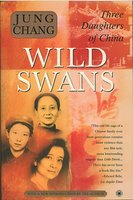
I recently finished reading Wild Swans by Jung Chang. This memoir has been banned in China since 1994 and apparently even pirated versions omit references to Mao.
Chang looks back over three generations of women in her family and the upheaval in their lives as they endured the Japanese occupation; the Civil War; Mao's rise to power; and the Cultural Revolution. It is a fascinating look at history and its effect on one family. From her grandmother, whose bound feet were an outward sign of her lack of freedom as a concubine to a powerful man, to Chang herself, who worked towards Mao's goals with a passion, the book describes the turmoil the Chinese have endured. It also is a tribute to their strength of character. It sold more than 10 million copies and was translated into 30 languages.
Chang has just published a controversial biography of Mao which is banned in China, but she hopes the first Chinese translation will break through. The book took 12 years to complete.
Ironically, the book Nineteen-Eighty-Four made her wonder, "in a naive way, if Orwell had ever been in China. I was reading about the society I'd been living in. How did he know?"



PABBIS uses my gay & lesbian children's books bibliography as source material for what-to-hate. I'm so proud.
The tone of that "what to do" page reminds me a lot of the tone of a letter I got recently from a parent. Like they suspect every teacher's goal in life is to traumatize their kids or something.
I sent out a permission slip saying that the MPAA is an American association, and as a result, most French movies aren't rated. I show a French movie once a month in my French class, and most of them have no rating. I try to choose movies I think would be PG-13 or below (the usual guidelines at my school) and I think that if anything, my choices lean more towards the G side of things. I got this rude letter from a parent saying, "There are plenty of good movies rated PG and below! Do the work to find them!" It's like he didn't even READ the permission slip that said NO THERE ARE NOT MANY PG FRENCH MOVIES OR MANY RATED FRENCH MOVIES AT ALL. So his 2 teenage kids have to go do an alternate assignment in the library when we watch Asterix or Tintin, which are geared towards the 8 to 12 range and would surely be rated G. Absurd.
I found it, and your site, quite by accident (although I heartily approve of yours). Pabbis is absolutely ridiculous--I can't believe they would even consider working against The Sisterhood of the Traveling Pants, which has very little content that could possibly be considered objectionable. It's an excellent book that contains far more good than bad. There is one sexual situation, but it does not go into detail and is relatively tame.
--Kate, age 12